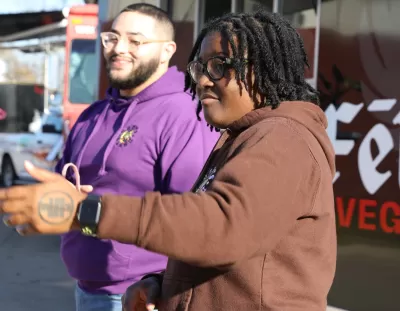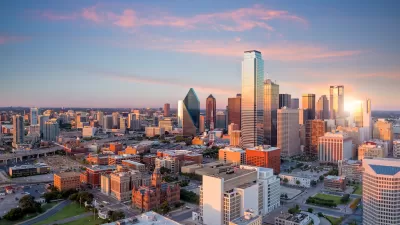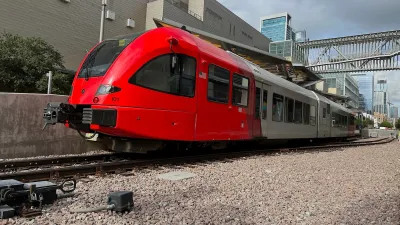Changing the legacy of racist planning policies requires a creative vision, practical solutions, and centering of the Black experience.

“From food deserts to tree inequity, racist planning practices have left Black neighborhoods devoid of amenities that promote health and well-being,” writes Alexa Spencer for Word in Black. The stark differences between Black neighborhoods and predominantly white communities are not happenstance, Spencer states, but “well-thought-out designs by urban planners, people who direct the development of cities and towns.”
This article, part of a series called Black to the Future, spotlights a “new crop” of urban planners that are seeking to change the legacy of racist planning practices with imaginative vision and practical planning solutions that center and uplift Black experience.
Such planners include Dee Powell, founder of Do Right By The Streets, a Black woman-owned urban planning and place creation group that crafts community-driven spaces. She is “on a mission to bring economic mobility and spatial justice to South Dallas, an area that is 35% Black with the highest rates of poverty in the city,” reports Spencer. Her most recent project is the Sunny South Dallas Food Park, which aims to provide a commerce space for Black-owned businesses and a place for residents to gather, have meetings, and connect to wifi. Powell dreams of “a revived Tulsa — or South Dallas — of the 1950s and 1960s, where Black folks thrived in health, community, and business.”
Do Right By The Streets is one of many groups nationwide working to build a prosperous future for Black communities via urban planning strategies. Others highlighted in the Word In Black article include Thrivance Group in California, Albina Vision Trust in Portland, Oregon, and Jima Studio on the East Coast.
FULL STORY: Urban Planning, But Add Some Afrofuturism

Montreal Mall to Become 6,000 Housing Units
Place Versailles will be transformed into a mixed-use complex over the next 25 years.

Planetizen Federal Action Tracker
A weekly monitor of how Trump’s orders and actions are impacting planners and planning in America.

Four Reasons Urban Planners Can’t Ignore AI
It’s no longer a question of whether AI will shape planning, but how. That how is up to us.

Bend, Deschutes County Move to Restrict Major Homeless Encampment
City and county officials are closing off portions of an area known as Juniper Ridge where many unhoused residents find shelter, hoping to direct people to housing and supportive services.

High Housing Costs Driving Down Transit Ridership in LA
When neighborhoods gentrify and displace lower-income residents, transit ridership suffers, new research shows.

Iowa Legalizes Accessory Dwelling Units
A new law will allow property owners to build ADUs on single-family lots starting on July 1.
Urban Design for Planners 1: Software Tools
This six-course series explores essential urban design concepts using open source software and equips planners with the tools they need to participate fully in the urban design process.
Planning for Universal Design
Learn the tools for implementing Universal Design in planning regulations.
City of Mt Shasta
City of Camden Redevelopment Agency
City of Astoria
Transportation Research & Education Center (TREC) at Portland State University
City of Camden Redevelopment Agency
Municipality of Princeton (NJ)
Regional Transportation Commission of Southern Nevada





























